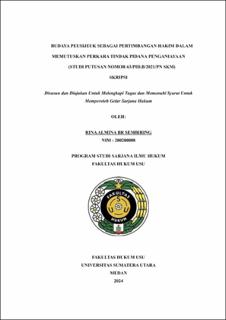| dc.contributor.advisor | Syahrin, Alvi | |
| dc.contributor.advisor | Marlina | |
| dc.contributor.author | Sembiring, Rina Almina Br | |
| dc.date.accessioned | 2025-03-13T03:32:44Z | |
| dc.date.available | 2025-03-13T03:32:44Z | |
| dc.date.issued | 2024 | |
| dc.identifier.uri | https://repositori.usu.ac.id/handle/123456789/102060 | |
| dc.description.abstract | Humans and culture are a bond that cannot be separated from this bond. Every culture must have a container and society is the container of that culture, so that culture and society cannot be separated. In the midst of the Peusijeuk community, it is used as a mediator or mediator in a problem that has not yet received a solution due to actions taking place in the community. The peusijeuk procession is used for all cases, both civil and criminal. Peusijeuk is carried out not only to resolve conflicts, but to express gratitude. The type of research that the author uses is empirical legal research using interview techniques and document studies with the nature of the writing used being descriptive from case decision studies. The data analysis method used is descriptive analysis using a qualitative approach so that it can describe, explain and explain the actual situation. The results of this research will show that peusijeuk can be used as a reason for forgiveness in criminal cases if the judge considers juridical and non-juridical aspects and considers things that reduce the sentence for the defendant. The resolution of criminal acts of abuse through the peusijeuk traditional tradition does not only involve the defendant and victim in making peace, but also involves the defendant's family, the victim's family, traditional leaders and the local community. Peusijuek also functions to restore the situation that escalated as a result of the crime that occurred and to enable the defendant and victim to establish a better relationship in the future. Peusijeuk is made as a reason for forgiveness because in the reason for forgiveness there is eliminating/eliminating the element of fault in the perpetrator and forgiving the perpetrator for his actions, in other words when there is a reason for forgiveness if we want to eliminate the criminal act from an orientation towards subjective elements | en_US |
| dc.language.iso | id | en_US |
| dc.publisher | Universitas Sumatera Utara | en_US |
| dc.subject | Culture | en_US |
| dc.subject | Peusijeuk | en_US |
| dc.subject | Crime | en_US |
| dc.subject | Judge's Considerations | en_US |
| dc.subject | Reasons for Forgiveness | en_US |
| dc.title | Budaya Peusijeuk sebagai Pertimbangan Hakim dalam Memutuskan Perkara Tindak Pidana Penganiayaan (Studi Putusan Nomor 63/Pid.B/2021/PN SKM) | en_US |
| dc.title.alternative | Peusijeuk Culture as a Judge's Consideration in Deciding Criminal Persecution Cases (Decision Study Number 63/Pid.B/2021/PN SKM) | en_US |
| dc.type | Thesis | en_US |
| dc.identifier.nim | NIM200200088 | |
| dc.identifier.nidn | NIDN0031036302 | |
| dc.identifier.nidn | NIDN0007037501 | |
| dc.identifier.kodeprodi | KODEPRODI74201#Ilmu Hukum | |
| dc.description.pages | 126 Pages | en_US |
| dc.description.type | Skripsi Sarjana | en_US |
| dc.subject.sdgs | SDGs 4. Quality Education | en_US |


